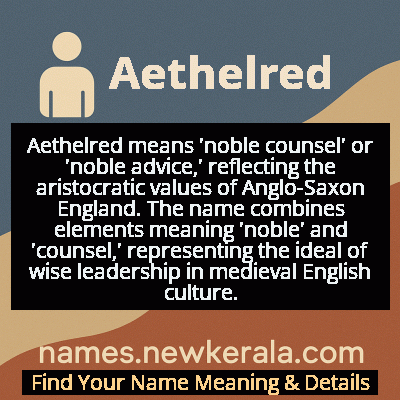Aethelred Name Meaning & Details
Origin, Popularity, Numerology Analysis & Name Meaning of Aethelred
Discover the origin, meaning, and cultural significance of the name AETHELRED. Delve into its historical roots and explore the lasting impact it has had on communities and traditions.
Name
Aethelred
Gender
Male
Origin
Anglo
Lucky Number
6
Meaning of the Name - Aethelred
Aethelred means 'noble counsel' or 'noble advice,' reflecting the aristocratic values of Anglo-Saxon England. The name combines elements meaning 'noble' and 'counsel,' representing the ideal of wise leadership in medieval English culture.
Aethelred - Complete Numerology Analysis
Your Numerology Number
Based on Pythagorean Numerology System
Ruling Planet
Venus
Positive Nature
Harmonious, responsible, caring, and artistic.
Negative Traits
Overly idealistic, superficial, possessive, or jealous.
Lucky Colours
Pink, turquoise.
Lucky Days
Friday.
Lucky Stones
Diamond, turquoise.
Harmony Numbers
2, 3, 9.
Best Suited Professions
Artists, musicians, teachers, healthcare workers.
What People Like About You
Warmth, nurturing nature, artistic flair.
Famous People Named Aethelred
Æthelred the Unready
King of England
Ruled during critical Viking invasions; his reign marked the decline of Anglo-Saxon England
Æthelred I of Wessex
King of Wessex
Co-ruled with Alfred the Great and fought Viking invaders
Æthelred of Mercia
King of Mercia
Ruled during Mercia's golden age and supported church reforms
Æthelred, Lord of the Mercians
Ealdorman
Governed Mercia under Alfred the Great's overlordship
Name Variations & International Equivalents
Click on blue names to explore their detailed meanings. Gray names with will be available soon.
Cultural & Historical Significance
The name's cultural significance extends beyond individual rulers to represent the entire Anglo-Saxon aristocratic system and its values. Its frequent appearance across the royal houses of Wessex, Mercia, and Northumbria demonstrates the interconnected nature of Anglo-Saxon royalty and shared cultural identity. After the Norman Conquest of 1066, the name rapidly declined in usage, making it a powerful symbol of England's lost Anglo-Saxon heritage and the cultural transformation that followed the Norman invasion. Today, Aethelred serves as a linguistic and historical touchstone for understanding the complex political landscape of early medieval England and the enduring legacy of its native ruling classes.
Extended Personality Analysis
Individuals bearing the name Aethelred are typically associated with a profound sense of nobility, tradition, and historical consciousness. They often carry themselves with natural authority and dignity, possessing a contemplative nature that values careful deliberation over impulsive action. This thoughtful approach can manifest as wisdom and strategic thinking in leadership roles, though it may also lead to perceived indecisiveness when facing complex challenges. Their noble bearing tends to inspire respect and loyalty from others, but may create emotional distance in personal relationships due to the weight of expectations associated with such a historically significant name.
The historical legacy of Æthelred the Unready adds complex layers to the personality profile, suggesting individuals who, despite noble intentions and good counsel, may struggle with the practical execution of their plans under pressure. This creates a character type marked by resilience in adversity and deep commitment to principles, even when these qualities lead to difficult outcomes. Aethelreds are often seen as guardians of tradition with a strong sense of duty, but they may face challenges in adapting to rapidly changing circumstances. The name suggests someone who embodies the eternal tension between idealistic vision and pragmatic effectiveness, making their personal journey one of balancing noble aspirations with the realities of implementation.
Modern Usage & Popularity
In contemporary naming practices, Aethelred remains an exceptionally rare choice, primarily confined to families with strong interests in Anglo-Saxon history or those seeking distinctly historical and unconventional names. Its usage is almost exclusively limited to the United Kingdom, particularly England, where it serves as a direct connection to pre-Norman heritage and national history. While there has been a general resurgence of traditional and vintage names in recent decades, Aethelred has not experienced significant revival due to its archaic nature and challenging pronunciation for modern speakers. The name appears occasionally in historical reenactment communities, academic circles focused on medieval studies, and among families with specific Anglo-Saxon heritage interests. Its complete absence from popular name rankings in English-speaking countries underscores its status as a specialist choice rather than a mainstream option, valued for its historical gravitas and uniqueness rather than contemporary appeal.
Symbolic & Spiritual Meanings
Aethelred symbolizes the ideal of noble wisdom and royal heritage, representing the complex relationship between counsel and action in leadership. The name embodies the concept of 'noble counsel' in its purest form—the aspiration toward wise guidance tempered by aristocratic responsibility and historical legacy. Symbolically, it represents the weight of tradition and the challenges of maintaining noble principles in the face of practical difficulties and changing circumstances. The historical association with Æthelred the Unready adds profound layers of irony and tragedy, making the name a powerful metaphor for the gap between intention and achievement in human affairs.
Metaphorically, Aethelred serves as a reminder of the eternal tension between thoughtful deliberation and decisive action, between maintaining tradition and adapting to new realities. It represents the burden of history that accompanies positions of leadership and the difficult balance required to transform noble intentions into effective outcomes. The name carries connotations of ancient wisdom, aristocratic duty, and the complex interplay between personal capability and historical circumstance that defines so much of human leadership and decision-making across generations.

